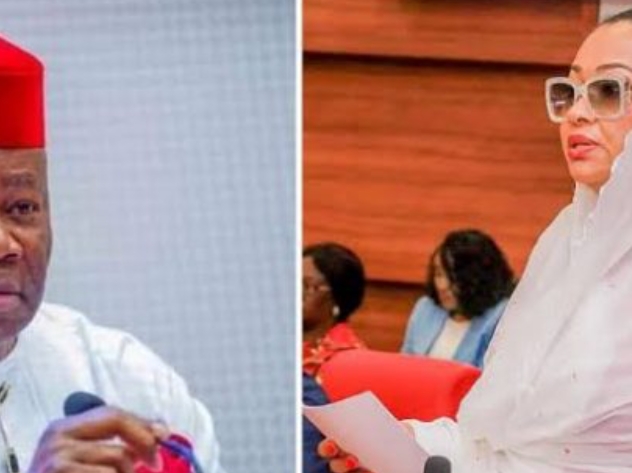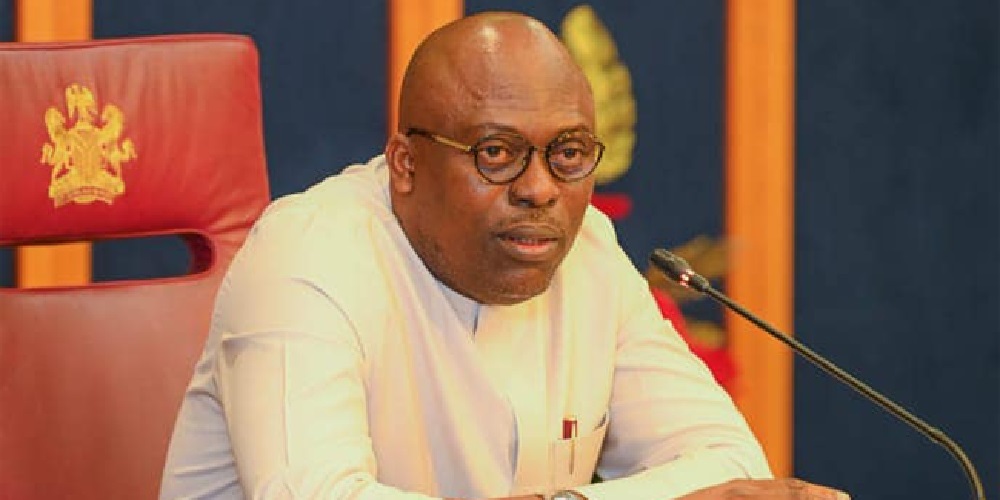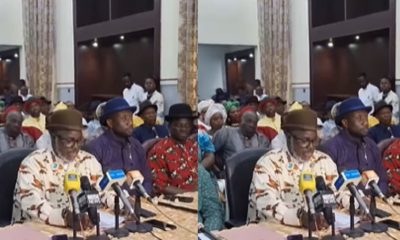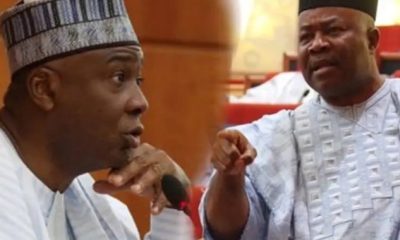News
Over 31m Nigerians facing acute food crisis -FG

The Federal Government has revealed that over 31.8 million Nigerians are currently facing severe food shortages, a situation exacerbated by ongoing security issues and the recent removal of fuel subsidies.
The distressing information comes from a study conducted by international development partners, which highlights a worrying increase in malnutrition among women and children.
The findings were presented during meetings with government officials earlier this week, as reported by the Ministry of Budget and Economic Planning. The study, a collaborative effort by the U.N. Food and Agriculture Organization (FAO), the Global Alliance for Improved Nutrition (GAIN), and the German development agency GIZ, utilized data from the Cadre Harmonise; a regional framework for food security; to assess the crisis.
The report states, “The surge in food commodity prices, driven by the removal of fuel subsidies and ongoing security challenges, has plunged millions of Nigerians into a precarious situation.”
Nigeria’s National Convener of Food Systems and Director of Social Development at the Ministry, Sanjo Faniran, emphasised that the study provides valuable insights into existing gaps, successes, and challenges, offering key recommendations for addressing the crisis.
The federal government’s report corroborates findings from other international organizations, including the World Bank, the International Rescue Committee (IRC), and the World Food Program (WFP). Earlier this year, the World Bank projected that seven northern states would face severe food security challenges due to rising food inflation and insecurity in major food-producing regions.
The Boko Haram insurgency in the Northeast has severely disrupted food production, leading to widespread destruction of farmlands. Similarly, conflicts between farmers and herders, along with ongoing banditry, have adversely impacted agricultural output in the Northwest and Northcentral regions.
The security issues, coupled with global food supply chain disruptions, have driven Nigeria’s food inflation rate above 40% as of June, although there has been a slight decrease in July.
In response to the crisis, the federal government is considering the implementation of state and community policing to protect farming communities. Additionally, the deployment of 10,000 agro-rangers across 19 states aims to address security concerns. The government has also approved a 150-day duty-free importation period for essential food items, including rice, maize, beans, and sorghum, to alleviate shortages until local harvests can meet demand. However, this measure has raised concerns among agricultural stakeholders who fear it may undermine recent gains in local food production.
News
BREAKING: Resign Within 48 Hours Or Face Impeachment, Rivers APC Tells Fubara

By Kayode Sanni-Arewa
The opposition All Progressives Congress (APC) has called Rivers State governor, Sir Siminalayi Fubara, to resign from office within 48 hours or be impeached by the State House of Assembly.
Chairman of APC in the state, Chief Tony Okocha, made the call on Monday morning while briefing journalists at his private residence in Port Harcourt, the state capital.
Okocha accused Fubara of insulting President Bola Tinubu, when he attempted to proffer a political solution to the crisis in the state.
He said: “As a political party, we are today advising the governor; there are two options, resign honourably or be impeached. That is the position of the All Progressives Congress. He has disrespected Mr. President and we told him that we cannot be here and have him to disrespect Mr. President.
“The offences are there; the Supreme Court has agreed and even provided us with more evidences. The House of Assembly does not need to set up any committee again to investigate him.
“48 hours is too much to give him as ultimatum. He should just resign honourably.”
News
Natasha’s Suspension is an insult to Kogi Central Constituents — Peterside

By Kayode Sanni-Arewa
Founder of Anap Foundation, Atedo Peterside, says the suspension of Kogi Central Senator, Natasha Akpoti-Uduaghan, by the Senate is an insult to her constituents.
In a post on X on Sunday, the founder of Stanbic IBTC Bank Plc described the suspension of the female lawmaker as disturbing.
“The most disturbing aspect of the Nigerian Senate hullabaloo around Natasha Akpoti-Uduaghan is that the Senate Leadership must be aware that her suspension for six months is ultra vires and also disrespectful to her constituents in Kogi State, but they don’t care,” Peterside stated, pledging that he stands with the female lawmaker amid her ordeal.
The most disturbing aspect of the Nigerian Senate hullabaloo around @NatashaAkpoti is that the Senate Leadership must be aware that her suspension for 6 months is ultra vires and also disrespectful to her constituents in Kogi State, but they don’t care
#IStandWithSenatorNatash
News
Petrol Imports Hit 105% To ₦15.42trn In 2024 — NBS

By Kayode Sanni-Arewa
The latest data by the National Bureau of Statistics (NBS) on the foreign trade statistics, said the increase was from N7.51trn recorded in 2023.
The development comes despite current increasing domestic refining capacity, especially at the 650,000 barrels-per-day Dangote Refinery and the ongoing rehabilitation of state-owned refineries.
In December 2024, the Nigeria National Petroleum Company Limited (NNPCL) announced the restart of the 125,000 barrels per day (bpd) Warri Refinery and Petrochemical Company (WRPC), which was approved for rehabilitation in 2021 for $897 million.
The Port Harcourt Refining Company (PHRC), with a total installed capacity of 210,000bpd, recently restarted operations at its old plant, which currently produces 60,000bpd.
Nigeria spent N2.01trn on fuel imports in 2020. By 2021, this figure more than doubled, rising by 126.9% to N4.56trn, indicating a sharp increase in import dependence and global price fluctuations. The upward trend continued in 2022, with import costs jumping by 69.1% to N7.71 trillion, driven by rising crude oil prices and Nigeria’s inability to refine a significant portion of its fuel needs locally. In 2023, petrol import expenditure recorded a marginal decline of 2.6% to N7.51 trillion, suggesting a temporary easing, possibly due to factors such as forex adjustments and lower global oil prices.
However, riding on the back of a 40.9% depreciation of the naira, 2024 saw a 105.3% increase to N15.42 trillion, the highest on record.
Despite the rise in local refining, production remains insufficient in meeting demands, necessitating continuous dependence on importation.
Supply chain inefficiencies, and persistent demand-supply imbalances, Foreign exchange fluctuations, among other factors, have also militated against meeting local demands, as the rising cost of petrol imports continues to strain government finances and consumer purchasing power.
Nigeria operates four national refineries: one in Kaduna, one in Warri, and two in Port Harcourt.
-

 News19 hours ago
News19 hours agoRivers crisis: Fubara finally bows, invites authentic lawmakers to meeting, offers to pay all outstanding allowances
-

 News8 hours ago
News8 hours agoVIDEO: WATCH moment RIPCO leaders urge INC to shun violence over Rivers crisis
-

 News17 hours ago
News17 hours agoJapa Bad side: “ How I Lost My Husband the Day We Arrived In Canada”
-

 News15 hours ago
News15 hours agoNatasha: “You Can’t Be Master In Judgment Over Your Case-Ex-First Lady Bombs Akpabio
-

 News18 hours ago
News18 hours agoBREAKING: Miyetti Allah leader shot dead by unidentified gunmen
-

 News14 hours ago
News14 hours agoSaraki to Akpabio: Do not trivialize call for due process in Senate
-

 News18 hours ago
News18 hours agoRivers Ijaw group cautions INC over calls to perpetuate violence
-

 News7 hours ago
News7 hours agoPalaver scatter CAN as outgoing leader rejects election






